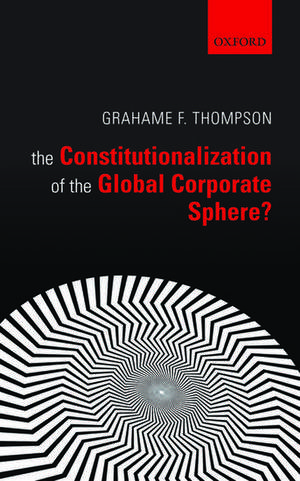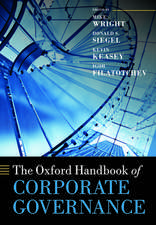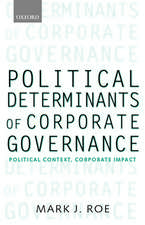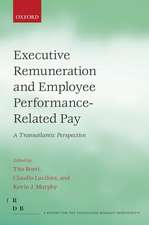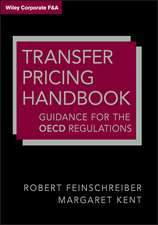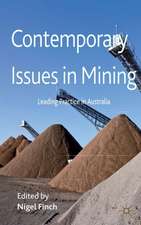The Constitutionalization of the Global Corporate Sphere?
Autor Grahame F. Thompsonen Limba Engleză Hardback – 25 oct 2012
Preț: 654.83 lei
Preț vechi: 942.15 lei
-30% Nou
Puncte Express: 982
Preț estimativ în valută:
125.32€ • 129.46$ • 104.30£
125.32€ • 129.46$ • 104.30£
Carte tipărită la comandă
Livrare economică 15-21 martie
Preluare comenzi: 021 569.72.76
Specificații
ISBN-13: 9780199594832
ISBN-10: 019959483X
Pagini: 236
Ilustrații: 1, black & white illustrations
Dimensiuni: 148 x 222 x 19 mm
Greutate: 0.41 kg
Editura: OUP OXFORD
Colecția OUP Oxford
Locul publicării:Oxford, United Kingdom
ISBN-10: 019959483X
Pagini: 236
Ilustrații: 1, black & white illustrations
Dimensiuni: 148 x 222 x 19 mm
Greutate: 0.41 kg
Editura: OUP OXFORD
Colecția OUP Oxford
Locul publicării:Oxford, United Kingdom
Recenzii
... this book is to be recommended. Anyone with an interest in the current global economic and political establishment would f ind much to admire in this text, with the caveat that readers with an optimistic view of globalisation may well be disappointed by the pessimistic account put forward by Thompson.
Grahame Thompsons book is a challenge to all those concerned with the role of global corporations in the current era. He asks fundamental questions about the nature and status of corporations and how they can be subjected to an international regime of accountability and transparency ... The result is a book brimming with stimulating ideas, concepts, and theories, together with radical, yet practical, policy suggestions built on a deep understanding of the global context, the role of law, and the nature of corporations. At a time when concern about the role of corporations, their leaderships, and their impact on inequality and the environment is so current and relevant, this book should be required reading for researchers in business and management and the social sciences more generally, as well as those claiming to be informed policy makers.
A work of great importance. As we might expect from one of our leading experts on globalization the book throws an invaluable light on the corporation as a global political and legal entity. Technically it is an extraordinary accomplishment: a crystal clear mobilization of material from many disciplines, notably law, political science, and applied economics. The argument is of great subtlety, summed up in Thompsons remark that not all companies are alike. The book is a must read for scholars and for policy makers.
Thompson deftly examines the development of an increasingly effective functional structure of constitutional law that persists in the face of a stubborn resistance to develop equally compelling coherent formal systems. In crafting this constituting universe of form and function, Thompson skilfully weaves a complex set of law and governance rules to produce a compelling picture of a fluid and fractured system that begins to outline the constitution of a system in which the key elements of public law constitutionalism, and principally rule of law principles, can be imported. Thompson's work should be required reading for anyone interested in the development of constitutional structures for corporate actors in the transnational sphere.
Grahame Thompsons book is a challenge to all those concerned with the role of global corporations in the current era. He asks fundamental questions about the nature and status of corporations and how they can be subjected to an international regime of accountability and transparency ... The result is a book brimming with stimulating ideas, concepts, and theories, together with radical, yet practical, policy suggestions built on a deep understanding of the global context, the role of law, and the nature of corporations. At a time when concern about the role of corporations, their leaderships, and their impact on inequality and the environment is so current and relevant, this book should be required reading for researchers in business and management and the social sciences more generally, as well as those claiming to be informed policy makers.
A work of great importance. As we might expect from one of our leading experts on globalization the book throws an invaluable light on the corporation as a global political and legal entity. Technically it is an extraordinary accomplishment: a crystal clear mobilization of material from many disciplines, notably law, political science, and applied economics. The argument is of great subtlety, summed up in Thompsons remark that not all companies are alike. The book is a must read for scholars and for policy makers.
Thompson deftly examines the development of an increasingly effective functional structure of constitutional law that persists in the face of a stubborn resistance to develop equally compelling coherent formal systems. In crafting this constituting universe of form and function, Thompson skilfully weaves a complex set of law and governance rules to produce a compelling picture of a fluid and fractured system that begins to outline the constitution of a system in which the key elements of public law constitutionalism, and principally rule of law principles, can be imported. Thompson's work should be required reading for anyone interested in the development of constitutional structures for corporate actors in the transnational sphere.
Notă biografică
Grahame F. Thompson is Professor of Political Economy at the Copenhagen Business School in Denmark, and Emeritus Professor at the Open University in England. His research and teaching interests have been in international political economy matters, particularly in respect to the issue of globalization. Recently he has re-focussed on the role of business organization in the context of international economic matters, dealing with questions of international law, global corporate citizenship, and the future of corporate governance.
